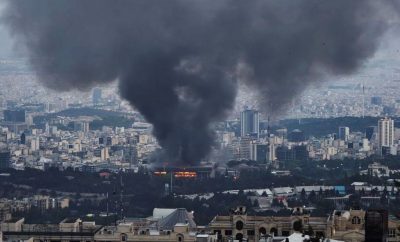
Russians feel new Iron Curtain close in
Two weeks ago, middle-class Russians could work at and buy from the biggest global firms, plan holidays in the West, get their news from vibrant (if embattled) independent outlets, and post as they pleased on social media.
State of play: With a new law promising prison time for journalists who so much as call Vladimir Putin’s war a “war,” foreign and domestic outlets are ceasing operations. Western firms are leaving. Social media platforms are disappearing. Borders are tightening. Protesters are being jailed en masse.
- “It’s over,” says Alexander Baunov, a senior fellow at Carnegie Moscow. “All the vestiges of liberalism will be purged.”
“The rules were clear and they are not anymore,” Baunov says. “We can’t say what is dangerous and what is not. You don’t know what sort of repression you can meet for the things that were tolerated before.”
- Educated Russians knew they were living in an autocracy, he says. Many had made peace with that. But they never expected to once again live in the type of country where “portraits of the Great Leader” hang on the walls.
- People who work in journalism, the arts or for global firms are watching their career prospects evaporate. Russians have fled the country by the tens of thousands.
- Educated Russians have long discussed the conditions under which they might emigrate, he says. For many, border closures, social media shutdowns and “the deglobalization of Russia” were their red lines, he says. Others simply feel that they can’t live as normal in a country that is attacking its neighbor.
Yes, but: That is, of course, a subset of the population. One independent poll cited in the Washington Post puts approval for the war at 58%, with 23% disapproving.
- Many Russians never shopped at IKEA, drank Starbucks coffee or watched Netflix, and thus won’t feel the shift as keenly.
- When the financial sanctions start to bite, many will be prepared to accept the Kremlin line that they are victims of economic warfare from the West that has nothing to do with the war in Ukraine, Baunov says.
- Sanctions have already pervaded daily life and conversations in a way they never did in 2014, but he’s not expecting them to push more Russians into the street. “The fear of repression is much higher than the discontent the sanctions make.”
But Russians aren’t entirely cut off from the West, or from the truth about the war.
- Telegram, the widely used social media app, is still operational. Online, Russians are flocking to virtual private networks.
- But Putin could still be fairly confident that when Russian forces bombed a maternity hospital in Mariupol — just 35 miles from Russia — only a sliver of the population would ever see the gruesome images, or believe their country was responsible.
The bottom line: The past two weeks were in some ways a step back in time. Coca-Cola, McDonald’s and Disney are leaving. A new Iron Curtain is taking shape.
-State of the war
Russian Foreign Minister Sergei Lavrov and his Ukrainian counterpart Dmytro Kuleba discussed the possibility of a meeting between their two presidents during talks on Thursday, but otherwise failed to come to an agreement on a ceasefire, Axios’ Zach Basu reports.
Driving the news: Kuleba said his top priority during the 1.5-hour talks was establishing a humanitarian corridor for Mariupol, a port city in southern Ukraine where Russian forces destroyed a maternity ward and children’s hospital on Wednesday as part of a brutal, weeklong siege.
- A senior Pentagon official told reporters this evening that Russian forces appear to have cut off and surrounded both Mariupol and Chernihiv, a city of 300,000 in northern Ukraine that has also faced days of heavy bombardment.
- Russian forces have made progress in the advance on Kyiv, the official said, moving within 3 miles of the capital from the north, with more troops approaching from the northeast and west.
In a somewhat unexpected twist, Israeli Prime Minister Naftali Bennett is attempting to mediate between Putin and Volodymyr Zelensky, Axios’ Barak Ravid reports.
- The leaders of Germany, France and Turkey are also in touch with both sides, and South African President Cyril Ramaphosa spoke to Putin today and said he’d been “approached to play a mediation role.”
- President Biden has no plans to speak with Putin, however. His administration isn’t even attempting diplomacy with Russia, believing Putin has no interest in off-ramps, per the Washington Post.
- But the U.S. is also wary of provoking Putin, hence the decisionnot to help Poland send warplanes to Ukraine.
Meanwhile, the UN says more than 2.3 million refugees have now fled Ukraine, Axios’ Erin Doherty writes.
- 4 million have fled to Poland. Adjusted for population, that’s like another Ohio’s-worth of people arriving in the U.S.
Go deeper:
- CIA director: Putin’s “propaganda bubble” is failing in Ukraine
- Why it’s so hard to quit Russian energy
- #AfricansInUkraine: Escaping students describe rejection at border
Πηγή: axios.com




